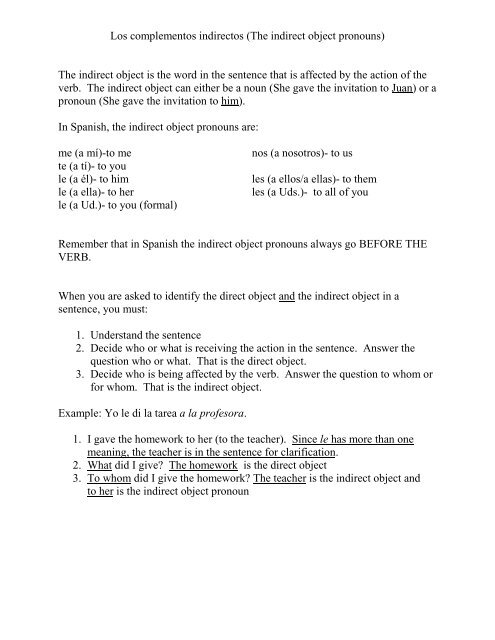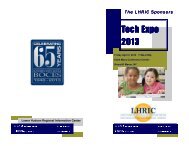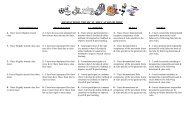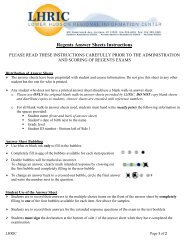Los complementos indirectos (The indirect object pronouns) The ...
Los complementos indirectos (The indirect object pronouns) The ...
Los complementos indirectos (The indirect object pronouns) The ...
You also want an ePaper? Increase the reach of your titles
YUMPU automatically turns print PDFs into web optimized ePapers that Google loves.
<strong>Los</strong> <strong>complementos</strong> <strong><strong>indirect</strong>os</strong> (<strong>The</strong> <strong>indirect</strong> <strong>object</strong> <strong>pronouns</strong>)<br />
<strong>The</strong> <strong>indirect</strong> <strong>object</strong> is the word in the sentence that is affected by the action of the<br />
verb. <strong>The</strong> <strong>indirect</strong> <strong>object</strong> can either be a noun (She gave the invitation to Juan) or a<br />
pronoun (She gave the invitation to him).<br />
In Spanish, the <strong>indirect</strong> <strong>object</strong> <strong>pronouns</strong> are:<br />
me (a mí)-to me<br />
te (a tí)- to you<br />
le (a él)- to him<br />
le (a ella)- to her<br />
le (a Ud.)- to you (formal)<br />
nos (a nosotros)- to us<br />
les (a ellos/a ellas)- to them<br />
les (a Uds.)- to all of you<br />
Remember that in Spanish the <strong>indirect</strong> <strong>object</strong> <strong>pronouns</strong> always go BEFORE THE<br />
VERB.<br />
When you are asked to identify the direct <strong>object</strong> and the <strong>indirect</strong> <strong>object</strong> in a<br />
sentence, you must:<br />
1. Understand the sentence<br />
2. Decide who or what is receiving the action in the sentence. Answer the<br />
question who or what. That is the direct <strong>object</strong>.<br />
3. Decide who is being affected by the verb. Answer the question to whom or<br />
for whom. That is the <strong>indirect</strong> <strong>object</strong>.<br />
Example: Yo le di la tarea a la profesora.<br />
1. I gave the homework to her (to the teacher). Since le has more than one<br />
meaning, the teacher is in the sentence for clarification.<br />
2. What did I give? <strong>The</strong> homework is the direct <strong>object</strong><br />
3. To whom did I give the homework? <strong>The</strong> teacher is the <strong>indirect</strong> <strong>object</strong> and<br />
to her is the <strong>indirect</strong> <strong>object</strong> pronoun
IDIOMATIC EXPRESSIONS THAT USE INDIRECT OBJECT PRONOUNS<br />
Study the following expressions.<br />
Gustar- to like<br />
Interesar- to interest<br />
Yo me gustó/gustaron- I liked me interesó/interesaroninterested<br />
me<br />
Tú te gustó/gustaron- You liked te interesó/interesaron - interested<br />
you<br />
Él/Ella/Ud./Singular le gustó/gustaron- He/She/You<br />
(formal) liked<br />
le interesó/interesaron - interested<br />
him/her/you (formal)<br />
Nosotros nos gustó/gustaron- We liked nos interesó/interesaron -<br />
interested us<br />
Ellos/Ellas/Uds./Plural les gustó/gustaron- <strong>The</strong>y/All of<br />
you liked<br />
les interesó/interesaron -<br />
interested them/all of you<br />
encantar- to love something (not<br />
someone)<br />
Doler- to hurt (la cabeza can be<br />
replaced by any body part)<br />
Yo me encantó/encantaron- I loved me duele la cabeza – my head<br />
hurts<br />
Tú te encantó/encantaron - You loved te duele la cabeza - your head<br />
hurts<br />
Él/Ella/Ud./Singular le encantó/encantaron -<br />
He/She/You (formal) loved<br />
le duele la cabeza- his/her/your<br />
(formal) head hurts<br />
Nosotros<br />
nos encantó/encantaron - We<br />
loved<br />
nos duelen las cabezas - our<br />
heads hurt<br />
Ellos/Ellas/Uds./Plural les encantó/encantaron - <strong>The</strong>y/All<br />
of you loved<br />
les duelen las cabezas – their/all<br />
of your heads hurt
















